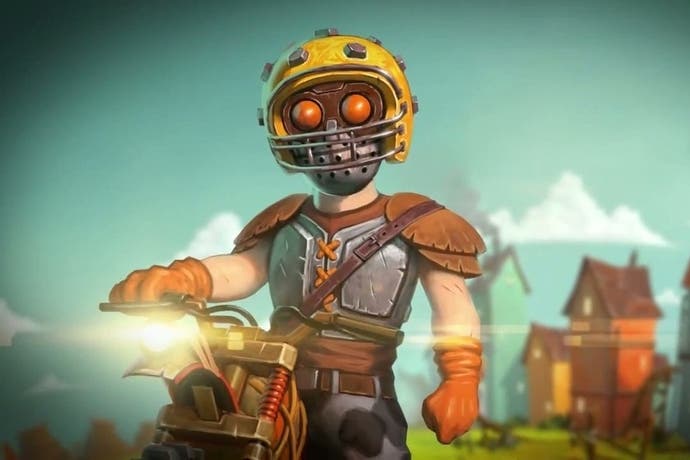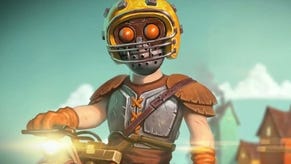Trials Frontier review
Bike curious.
RedLynx has made its name by placing fiendish hurdles in front of players. In taking its beloved Trials series to mobile, it has erected a few obstacles in its own way. Namely: how to adapt the games' famously nuanced control to a touchscreen, and how to translate their firm-but-fair approach to victory to the baggier requirements of free-to-play. In both instances, Trials Frontier grinds its gears and suffers penalties - but it's not quite the fatal crash fans might expect.
One of the big changes from Trials past is that there's now a story, of sorts, populated by a colourful cast of characters in a dusty frontier town. You've wound up there after an opening level cave-in - sadly, not the last time the game forces failure on you to move its tale forwards - and since the townsfolk have been ripped off by a rival biker, you're recruited to save the day.
To begin with it still feels a lot like Trials, despite the superfluous trimmings and cartoony visual style. Your early objectives are simply to beat the courses that are opened up for you on the map screen, and while those courses are noticeably shorter and simpler than what Trials devotees will be used to, enough of the petrol-fumed atmosphere has been retained.
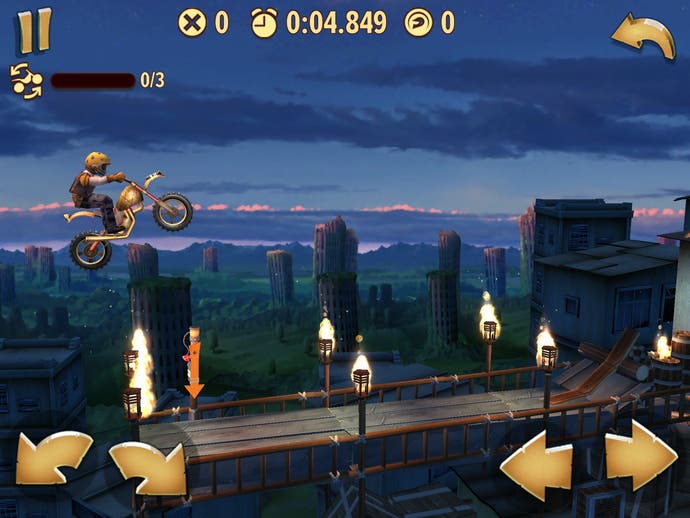
The key question, though, is how it controls. This is a series built around absolute precision: the ability to gain that little extra momentum by shifting your rider's weight just so, giving you just enough speed to clear an obstacle but not so much that you end up wasting precious seconds in the air. For expert players - who, admittedly, are certainly not Frontier's audience - it's a game of muscle memory, where tiny twitches of the thumb happen through pure intuition.
Acceleration and braking are recreated well enough, with nice big arrows in the bottom right, large enough that even the clumsiest thumb won't miss them. Bottom left is where you find the buttons that shift your rider forwards or backwards on the bike. Using these to pull off mid-air flips isn't too bad. It feels more slippery than previous Trials titles, but the change is easy to adjust to. When it comes to the really important stuff - those little adjustments that get you up a steep ramp a fraction of a second faster - the cold input of the touchscreen really struggles.
That this isn't a huge problem to begin with is mostly down to Frontier's structure. This isn't a game that is massively concerned with beating a track or shaving milliseconds off your time. Mostly, you'll be playing tracks to undertake missions for the various characters, each with their own distinct fixation. A young fanboy is the one who sets you stunt challenges, for example, rewarding you for performing a specific number of flips, or spending a certain amount of time in the air or in a wheelie. The town's mapmaker is the guy who introduces new areas, while the mechanic points you in the direction of upgrades and blueprints for different bikes.
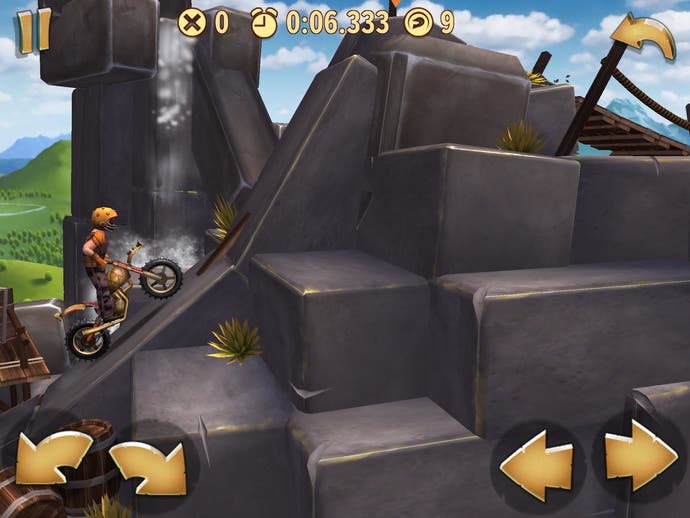
The DNA of classic Trials is really only felt in the demands of a crusty prospector, who requires silver and gold medals to pass his missions, and what amount to boss races. These are sometimes unfairly skewed to ensure you've upgraded your bike enough - a problematic process which we'll come to in a moment - but mostly exist to force you to get a perfect run, since the entirely scripted AI racer makes few mistakes. Sadly, most of the times you fail these encounters, it won't be because you screwed up, but because you lost those vital seconds wrestling to get momentum up a slope thanks to the intangible controls.
Even then, you're rarely asked to truly excel, to push yourself harder. You can do, of course, by summoning the ghosts of your friends' best runs, but mostly you'll do this of your own volition rather than because the game expects or demands superlative play. There are no tracks here where you'll spend hours trying to perfect a certain obstacle, no barriers to progress that require skill to pass.
The reason that Frontier is never as demanding as a Trials game should be is because it's free-to-play, and if you scare players off by insisting they get better then they'll never pay up. Instead, the biggest barriers that Frontier erects are those that draw on your patience rather than your ability.
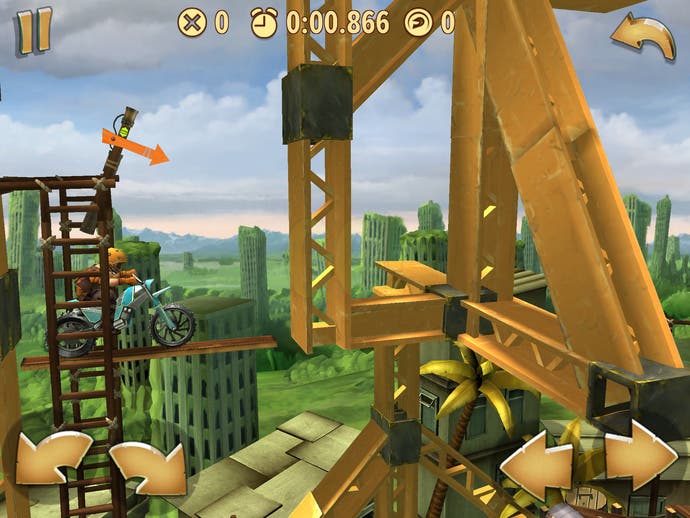
So, yes, there's an energy mechanic. It's fuel in this case, and you use up five of this resource every time you start an event. The game thankfully doesn't repeat the charge no matter how many times you restart, so that vital aspect of the Trials experience hasn't been entirely monetised. But the screws are in place, and they do get tightened. You'll earn coins for completing missions and for the number of checkpoints you pass without a foul, but the hard currency - diamonds - is the one that proves most useful.
After each race, there's a wheel of fortune mini-game where you can win bike parts, and if you fail to win the piece you need, you can cash in a few diamonds to spin again. With each spin, you can enlarge the area of the wheel allocated to the item you want, so right away there's an incentive to keep dipping into your diamond stash. You'll also be tempted to do that in order to speed up the upgrades to your bike, which inevitably start out taking seconds and soon stretch to north of an hour.
It doesn't take long for progress in the game to be tied not to your medals, but to how much loot you can grab from the spin of a wheel. You can do it without paying - you always can - but that means a lot of grinding through the same tracks over and over. By the time the game introduces an additional layer of crafting, where you have to collect basic items and then craft those into even better items to craft into usable upgrades (all of which, of course, can be bypassed by spending diamonds) you may start to wonder where the soul of Trials has gone.
It wasn't the freemium mechanisms that turned me off Trials Frontier, but a cumulative erosion of my enthusiasm based on the not-quite-there touch controls and the emphasis on upgrades and resource grinding over gameplay prowess
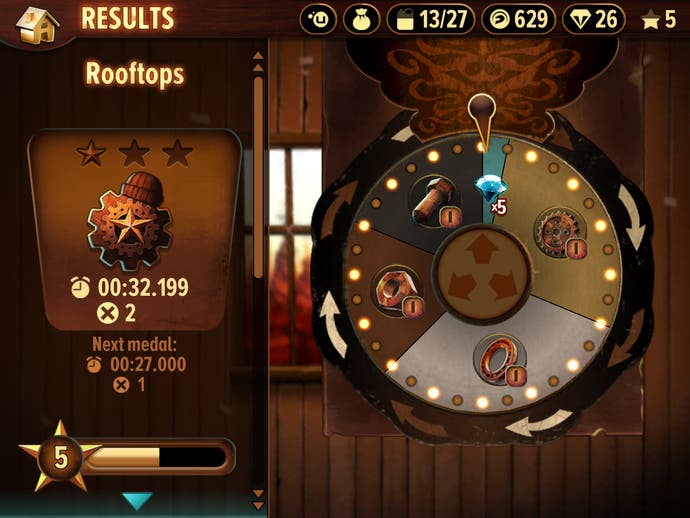
It is, amazingly, still there. Just about. It may be damning the game with faint praise, but Frontier's micro-payments, while very visible, are never as intrusive as they might have been. The game certainly doesn't shy away from suggesting you spend your diamonds, but nor does it hold back in dishing them out. You're unlikely to earn enough to speed up your progress dramatically, but every wheel spin has a tiny chance of earning five diamonds back, and they're also handed out as mission rewards fairly frequently.
In the end, it wasn't the freemium mechanisms that turned me off Trials Frontier, but a cumulative erosion of my enthusiasm based on the not-quite-there touch controls, the emphasis on upgrades and resource grinding over gameplay prowess and the knowledge that, in keeping with all free-to-play games of this sort, those annoyances can only escalate over time. But then, was this ever meant to be our Trials game for 2014? RedLynx has clearly chosen to create next week's Fusion for the hardcore and Frontier for the Clash of Clans crowd.
Trials has always been frustrating. That's part of its genius. Pitch the difficulty of a game just right, whether you're talking about MegaMan or Dark Souls, and frustration can be incredibly satisfying, even addictive. That's the feeling that classic Trials deals in, but not Frontier, which opts for a more pedestrian sort of frustration - the feeling that the goalposts are being moved, that progress is purposefully bogged down in needless clutter. You'll still catch glimpses of the game you remember in amongst that clutter; whether that's enough to have you splashing out on virtual gems is another matter.
